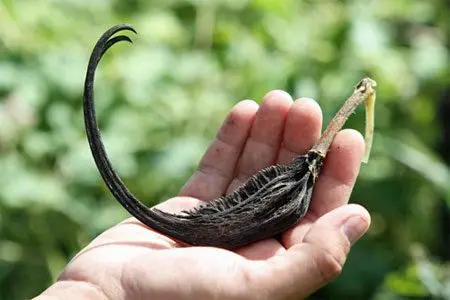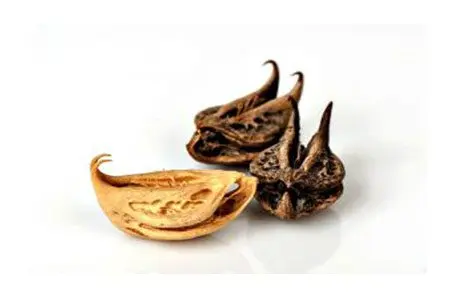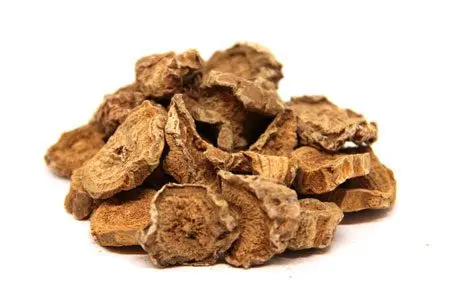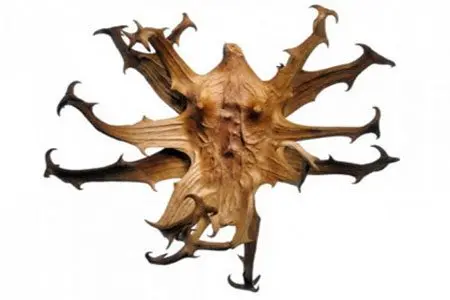Contents
What is a devil’s claw?

Devil’s Claw – this plant native to South Africa, scientifically known as Harpagophytum, got its gloomy name due to the presence of hook-shaped formations on the fruits. Alternative medicine uses devil’s claw root to treat arthritis, stomach upset, fever, and pain.
Devil’s Claw (Latin name Harpagophytum procumbens) in Western literature – Devil’s Claw. Active substances are found in large quantities in the root of the plant, which is used as a natural food supplement.
The healing properties of the devil’s claw

Iridoid glycosidic compounds have been found in the root of the devil’s claw, which have a pronounced anti-inflammatory effect. In the course of research, the antioxidant effect of iridoid glycosides was established. The results of the experiments showed that active phytocompounds protect tissue cells from the negative effects of free radicals. The data obtained served as the reason for further study of the devil’s claw as a means for the treatment of diseases accompanied by an inflammatory process – arthritis and gout. Later it was found that preparations based on the root of the devil’s claw are able to reduce weight.
Phytopreparations containing prostrate harpagophytum are available in various dosage forms – capsules, powders, infusions. Devil’s claw is an ingredient in various herbal formulations.
Anti-inflammatory effect

The body reacts to internal and external pathological factors by developing inflammation. This is a natural immunological response to a violation of the integrity of tissues, organs and the constancy of the internal environment. Infectious diseases, injuries are the most common causes of signs of inflammation.
During inflammation, the body activates its protective functions, protecting itself from harm. It is beneficial in some acute conditions, but chronic inflammation tends to impair a person’s health. A chronic inflammatory process causes the appearance of cardiovascular diseases, diabetes, disorders of brain activity. Symptoms of inflammation are characteristic of some bowel diseases, gout and arthritis.
A number of animal experiments have been conducted to study the anti-inflammatory properties of devil’s claw. A study in mice led to the conclusion that iridoid glycosides inhibit the pathogenic properties of cytokines – specific molecules responsible for the appearance of inflammatory processes.
Laboratory research on the properties of the devil’s claw continues to the present. The first results already give hope for the creation of effective alternative drugs for the treatment of diseases characterized by inflammation.
For the treatment of osteoarthritis

Medical observations in the United States have shown that more than 30 million adults in the country suffer from the most common form of arthritis, osteoarthritis. The disease is characterized by gradual abrasion of hyaline cartilage covering the articular surface of the bones. The bones begin to rub against each other, which leads to the formation of edema, limited mobility, and pain in the joints.
To confirm the effectiveness of the use of the devil’s claw in patients with osteoarthritis, a study was conducted on 122 patients with injuries of the knee and hip joints. Taking the devil’s claw at a dosage of 2610 mg allowed to reduce the intensity of the pain syndrome. The analgesic effect is achieved by the action of plant phytocomponents, which are similar to diacerein, the main drug for the treatment of joint pain. [1]
Another study used devil’s claw along with turmeric and bromelain. Participants of the experiment – 43 patients with chronic osteoarthritis – were offered a combined composition for 2 months. After this time, it was found that pain decreased by 46%. [2]
The study of the analgesic properties of the devil’s claw in the treatment of osteoarthritis continues to the present. Researchers are analyzing the composition of a diacerein-like element to create an effective pharmacological drug.
In the treatment of gout
Gout is a common form of arthritis, which often leads to disability, can cause death of the patient. The disease is characterized by destruction of the joints. The toes, ankles and knees are especially affected. With gout, there is a specific reddening of the skin over the articular surfaces, severe swelling, soreness.
The cause of the disease lies in the pathological increase in the level of uric acid in the blood, formed during the breakdown of purine. This substance, which has a crystalline structure, is present in some foods. Therapeutic tactics for gout involves the appointment of non-steroidal anti-inflammatory drugs. The well-known anti-inflammatory, analgesic qualities of the devil’s claw made it possible to use it as an alternative to pharmacological agents.
There is an opinion that the devil’s claw is able to reduce the concentration of uric acid in the blood. Data supporting this hypothesis comes from studies in mice. High doses of Harpagophytum procumbent have been shown to reduce uric acid levels. Data on the effect of the devil’s claw on the human body as a treatment for gout is not yet available.
Back Pain Relief
Painful sensations in the spine are familiar to almost the entire adult population. Lower back pain comes out on top – 80% of cases. Given the ability of the devil’s claw to eliminate signs of inflammation, there is a possibility that it will have an analgesic effect for lower back pain. This is possible thanks to harpagosides – the active phytocomponents of the plant.
Scientists have performed a study to study the properties of the extract of harpagosides. Two groups of patients took part in the experiment – one was given the preparation of the devil’s claw, and the other was given the non-steroidal anti-inflammatory drug Viox. After 6 weeks, the results of the experiment were evaluated. Patients in the harpagoside group reported a 23% reduction in pain. In the group that took Viox, the subjects experienced a 26% reduction in pain intensity. [3]
In two other medical studies conducted independently, patients were asked to take 50-100 grams of harpagosides every day. It was concluded that the devil’s claw significantly reduces pain.
Given the effect of harpagosides, scientists are considering devil’s claw as an alternative treatment for pain in the lumbar spine. In order to confirm the analgesic effect, a number of scientific experiments are being carried out.
For weight loss
In addition to having an analgesic and anti-inflammatory effect, the devil’s claw can suppress hunger. This occurs when active plant substances interact with ghrelin, a peptide hormone responsible for appetite. Ghrelin is synthesized by the cells of the gastrointestinal tract, activates the brain cells that are responsible for the excitation of hunger.
A study aimed at studying this feature of the devil’s claw was carried out on mice. Animals that received Harpagophytum procumbent ate much less food over the next four hours, compared to the group that received placebo.
The effect of the devil root on the suppression of hunger in animals is of interest for human trials. But at the moment, such studies are not performed due to lack of information about the effects on humans.
Side effects, interactions with other drugs

There is good evidence that Devil’s Claw at 2610mg does not cause any symptoms. Data on the use of funds for a long time is not available at the moment.
Side effects include:
Dyspeptic disorders.
Allergy.
Headache.
Cough.
There are a number of diseases whose symptoms can be exacerbated by the use of the devil’s claw:
Cardiovascular diseases. Devil’s claw can cause heart rhythm disturbances, blood pressure surges.
Diabetes. Phytocomponents can interact with antidiabetic drugs, reduce the amount of glucose in the blood.
Cholelithiasis. Devil’s Claw activates the synthesis of bile, exacerbates symptoms in the presence of stones in the gallbladder.
Stomach ulcer. The use of the devil’s claw increases the acidity of the gastric juice. This can aggravate the course of stomach and duodenal ulcers.
Devil’s claw can adversely affect the body when combined with non-steroidal anti-inflammatory drugs, anticoagulants, drugs that reduce the acidity of gastric juice.
Nonsteroidal anti-inflammatory drugs. Devil’s claw inhibits the action of NSAIDs (Motrin, Voltaren, Felden, Celebrex).
Anticoagulants. Devil’s claw enhances the effect of anticoagulants, causing bleeding, the occurrence of hematomas (Coumadin).
Antacids. Devil’s claw inhibits the action of drugs that reduce the concentration of acid in gastric juice (Famotidine, Omeprazole, Zantac, Lansoprazole).
Before you start taking Devil’s Claw, you should consult with your doctor. Only a doctor can allow the supplement to be taken if you are being treated with any pharmacological drugs.
Allowable dosage

Devil’s claw supplements are available in the form of capsules, tablets, powder, extract. Before you start taking it, you should study the content of active elements – harpagosides.
For the treatment of osteoarthritis, lumbar pain syndrome, it is recommended to take the devil’s claw at a dosage of 600 to 2610 mg per day. The extract of harpagosides in the amount of 50-100 mg complies with these recommendations.
For osteoporosis, devil’s claw is given in the form of an AINAT supplement. The composition of the drug includes: 300 mg of prostrate harpagophytum, 200 mg of turmeric, 150 mg of bromelain. Bromelain is an enzyme effective in inflammation.
All studies using the devil’s root were conducted no more than 12 months. The short duration of the experiments made it possible to verify the safety of the dose of the devil’s claw in the amount of 2610 mg. If you have diabetes mellitus, any heart disorder, kidney stones, stomach ulcers, taking devil’s claw may increase the symptoms of these diseases.
When treating with non-steroidal anti-inflammatory drugs, anticoagulants, antacids, it should be remembered that the devil’s claw can interact with them. This will lead to a decrease in the effectiveness of pharmacological agents.
Instead of a conclusion

Preparations, which contain an extract of the devil’s claw, can reduce pain, eliminate the symptoms of inflammation in arthritis, gout. Phytoextracts restore joint mobility, eliminate swelling. In addition, the devil’s claw affects the production of hormones responsible for the occurrence of hunger, suppresses appetite.
Numerous studies have concluded that the safe dosage of devil’s claw is 600-2610 mg per day. There are no official medical recommendations for this.
If you adhere to the recommended dosage, the likelihood of side effects is extremely small. It is necessary to take into account the presence of certain somatic diseases, the intake of certain groups of drugs, so as not to cause an aggravation of symptoms or reduce the therapeutic effect. Before you start using dietary supplements with the devil’s claw, you should consult with your doctor to assess the likelihood of developing negative consequences.









